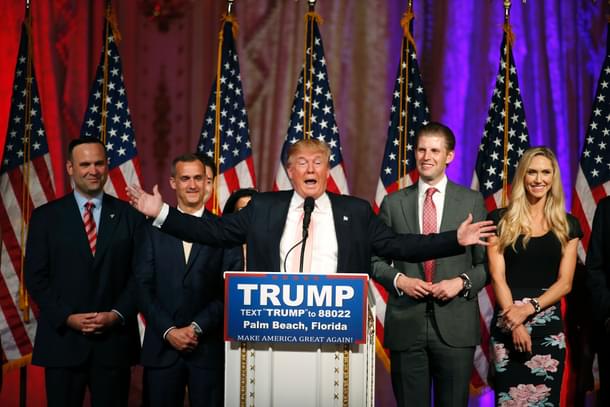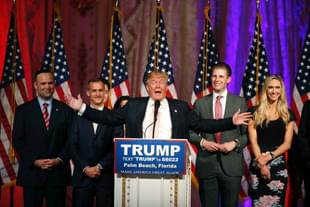Politics
Trump Presidency: Can Media Demand A Veto Power In A Democratic Polity?
Sudip Kar Purkayastha
Jan 24, 2017, 04:10 PM | Updated 04:10 PM IST
Save & read from anywhere!
Bookmark stories for easy access on any device or the Swarajya app.


Thanks to crass commercialisation of mainstream media, we have been accustomed to seeing most newspapers and television channels these days promoting their respective political patrons, forgetting the ethics of social responsibility, neutrality and objectivity. Ugly manifestation of this trend was noticed in India on the eve of various state and general elections. Memories of 2014 general election are green in people’s memory. However, such stridency, not infrequently quite undeserving, became subdued after the electors delivered their verdict. But what is happening in the US surrounding Donald Trump's presidency seems to be unprecedented.
Mainstream media, CNN being the most prominent, is continuing its relentless tirade against the new leader, even after his taking over as the President. And if their reporting is to be taken at face value, the anti-Trump protests are still raging in several other parts of the world. Not only the vehemence but the expanse and longevity of the reported unrest amongst people compel us in India, who are relatively less informed, to delve into the reasons for this extraordinary phenomenon.
There are three key elements to understanding the ongoing agitation. First, why Trump? Second, who is Trump? Third, why does Trump invite such media wrath?
Trump, without much experience and almost an outsider in the US political arena, made it big on his arrival because of several cardinal mistakes by his predecessors, including of course the last incumbent. The cumulative policies of the former presidents robbed a sizeable section of the common Americans of their jobs and economic prosperity, fostered groups of pseudo-liberals who sought to suppress the values cherished by majority of Americans, facilitated the emergence of Islamic State, bled Syria, caused huge avoidable demographic upheaval across Asia and Europe, and enforced deployment of huge US defence forces and resources to manage the resultant instability. The unwarranted scale of such unproductive external engagement cost the US dearly over last two decades in terms of resources and manpower, caused the domestic industry emigrate, forfeited job opportunities, robbed common men of their affluence.
Simultaneously, to their great anguish and resentment, the pampered bodies of pseudo-liberal intellectuals inside the country sought to influence the state policies in favour of unbridled globalisation, suppression of the values cherished by majority of Americans, and diversion of the energy of the youth in pursuing the goal of ‘freedom of choice’ to absurd levels. Trump’s electoral victory reflects the deep dissatisfaction of majority of Americans on these scores.
On the question of who is Trump, our knowledge is still inadequate. Even several experts describe him in the catch phrase ‘unknown quantity’. Till recently, our perception of him was on the basis of inputs coming from the mainstream US media or their tributaries in India. It is only recently that we are seeing and hearing him live on television, which constitute our direct knowledge. With the benefit of facts that are verifiable and this firsthand input, however small, we may make an attempt to separate grain from chaff.
It is a fact that Trump has been a highly successful businessman with vast business interests across the world. The positive takeaway from this fact is that we may infer him being a good strategist who can think long-term. He is also rich enough not to be compromised with some slices of chunks of donations, as has reportedly been the case with foundations attaching to few past US presidents. Based on his election campaign and post-oath taking speech, he emerges as an ardent nationalist, who, his critics warned, would practise protectionism in trade and isolate America. But this fear seems to be exaggerated. There is no reason to imagine that a nationalist country would not engage in trade. Nationalism and international trade can very well co-exist.
On the negative side, Trump can be scrutinised lesser. We have only media stories to form judgement. Ever-bulging body of reports have been doing the rounds in the mainstream media that project dark sides of his moral character, often involving improper sexual conducts. People allegedly affected by his inappropriate acts have come, one after another, with their stories in newspaper and on television channels. However, to constitute adequate, convincing and irrefutable accusations, those ought to have been backed by court verdicts.
It is, however, significant that Trump won an emphatic electoral victory despite these damning stories. This could be due to either of these two reasons. First, people thought that Trump, notwithstanding the reported moral depravities, was better than his alternatives. Second, the mainstream US media had lost their credibility and majority of American people seemed uninterested in what they struggled to convey. Notably, these media had used other techniques as well to influence the voter. They carried one ‘opinion poll’ after another, most of which gave Hillary Clinton a clear lead. One magazine had even printed an issue with its cover page welcoming Clinton to the White House. After the verdict came, the magazine had to recall and destroy the copies.
America has been indisputably known as the most powerful democracy with robust system to ascertain the ‘choice’ of the people. Its government has been known as one ‘of the people, for the people, by the people’. It is deeply intriguing to find that after the country has delivered a clear verdict, the mainstream media is still carrying out campaign against the elected President of the American people in a vicious manner. Some posters that are highlighted by the media like the one that described the post-election country as ‘Divided States of America’ or ‘Not Our President’ ridicule the very democratic system of the country.
Considering the aggressive posture of the mainstream media that have global branches and associates one can even suspect their role, motivational or otherwise, in the staging of a series of anti-Trump demonstration in several other countries, which have tenuous links to the US. It may not be inappropriate to say that top rung media houses deftly leveraging their power to influence public opinion on this issue as there are sizeable chunks of people in today’s world, especially the impressionable youth, who have outsourced their political opinions to leading media like CNN and BBC.
Trump supporters would see a nexus between the mainstream media and the pseudo liberals in these demonstrations. The manner in which a systematic and sustained campaign is underway, serious concerns are bound to arise. Through their unrelenting confrontational activities they seem to be questioning the very basis of democracy as a form of governance and demanding a ‘veto’ for the media. In other words, they seem to proclaim that it is not enough that the people elect their president but the person so elected must also be acceptable to the media.
It is public knowledge that media outlets are owned by corporate houses with global linkages and they have their own axes to grind. In practice, they also profitably use the pseudo liberal intellectuals to advance their own goals and interests. But the conflict between the media and elected government of any country was never possibly as serious and with such deep implications as seems to be the present case.
Democracy is a form of government that has evolved over time after several centuries of experiments. There is of course scope for improving the checks and balances. But adopting a muscular style and trying to maim voices of majority can bring them unintended results. We find consequences of such misadventures in Brexit. US election is its second important manifestation. There are also reports of rise of rightist political parties in France, Germany and Scandinavian countries. These ought to be warning signals to both the mainstream media and the pseudo liberals. By going too far they may witness total forfeiture of their own credibility and end up fostering dictatorial tendencies in the elected governments they are opposing!
Sudip Kar Purkayastha is an author. His latest book ‘On the Road to Freedom: Footprints on Indian History’ is a two volume work. A former banker and consultant Purkayastha was also the founding editor of ‘Indian Journal of Bank Marketing’. He had written articles in several national dailies & journals.





